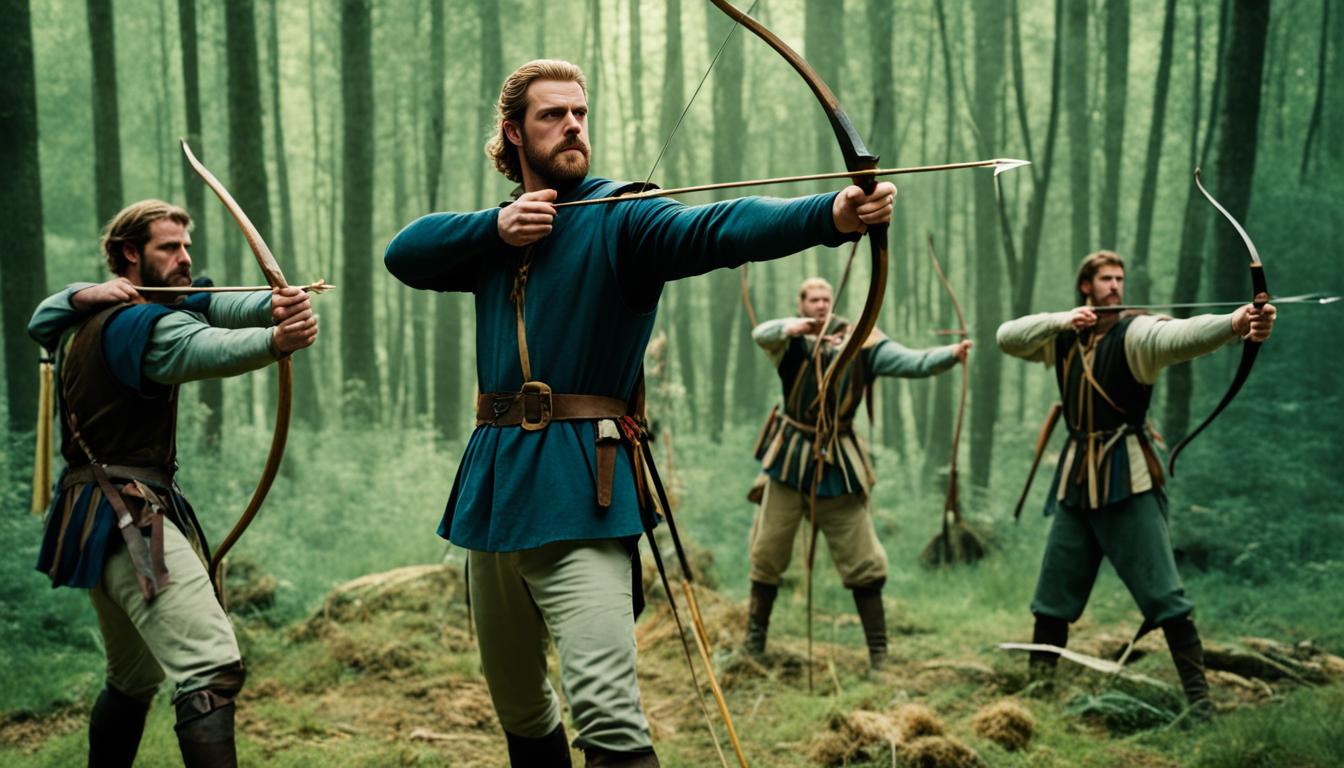In medieval England, archery was more than just a hobby. It was a must for all men. The Mandatory English Archery laws were key to the country’s military strength for many years. They made sure men of certain ages had bows and arrows, always ready to defend their land.
These laws were serious. Men aged 15 to 60 had to have archery gear and keep it in good shape. They also had to practice often, even on Sundays and holidays. This kept England’s archers skilled for war.
If men didn’t follow these archery laws, they faced big penalties. These laws stayed in place well into the 19th century, even when archery was less important for fighting. This training helped England win many battles, especially against the French.
Key Takeaways
- Archery was legally required for English men aged 15-60
- The ‘Assize of Arms’ in the 13th century initiated mandatory archery
- King Edward III’s 1363 law made archery practice mandatory on holidays
- These laws aimed to ensure a ready supply of trained archers
- Mandatory archery played a crucial role in English military victories
- Some archery laws remained unrepealed until the 19th century
The History of Mandatory English Archery
In 1252, England passed a law that changed its military for centuries. This law made it a must for men to have bows and arrows and practice often. By 1511, all men under 40 had to learn archery. By 1541, even men up to 60 were required to follow these rules.
The Welsh Celts created the longbow around 1180 CE. It became England’s key weapon in the 1300s. This powerful tool led to victories at Crecy, Agincourt, and Poitiers. These battles showed how effective skilled archers were against armored knights.
These early laws aimed to build a strong defense force. The government wanted a steady supply of skilled archers for battles. This focus on training helped England keep its military lead for many years.
The longbow’s role in warfare made archery a key skill for English men. These laws influenced England’s military and social setup for generations. The legacy of mandatory archery training lives on in today’s archery traditions and competitions.
The English Longbow: A Weapon That Changed Warfare

The English longbow changed medieval warfare. It was 6-7 feet tall and made from yew. This powerful weapon could shoot arrows over half a mile, beating the crossbow in range and speed.
Skilled archers could fire up to 20 arrows a minute. This made it a strong force on the battlefield.
The longbow’s impact was huge. Its arrows could go through chainmail and armor. This gave ordinary soldiers an advantage over knights. The Battle of Crecy in 1346 showed how effective the longbow was when English archers beat a bigger French force.
Archaeological finds from Henry VIII’s ship Mary Rose have given us new insights. They show how to build and use the longbow. These discoveries have shaped our view of medieval archery and affect modern archery license laws.
Today, compulsory archery courses and obligatory archery certifications honor the English longbow’s legacy. They keep its history alive in modern archery training.
Legacy and Decline of Mandatory Archery in England
Medieval archery laws made England’s military strong for many years. These laws made men practice with longbows often. Archery was so important that it lasted until the 1800s.
But things changed. Firearms became more important, making the longbow less needed. In 1845, a new law ended some old archery rules. This was the end of making archery mandatory in England.
Yet, the longbow’s impact is still felt. Archery became an Olympic sport in 1900 and again in 1972. Now, groups reenact medieval battles, keeping the legacy of English archery alive. Stories of Robin Hood still make people interested in this old skill.
Archery is still a popular sport, even though it’s not required anymore. It reminds us of a time when England’s strength came from its skilled archers. This history helps us understand England’s past and its impact on warfare.

Leave a Reply